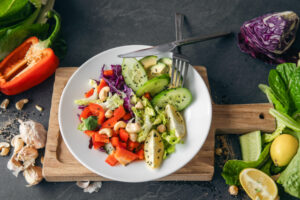Good nutrition during the summer months is not just a matter of appearance, but also of health. With high temperatures and increased activity, your body needs the right support. In this article, you’ll discover six key nutrition tips to help you enjoy a healthy and energetic summer. By following these guidelines, you’ll feel better, have more energy and protect your body from the challenges of the season.
1. Stay hydrated
The importance of hydration in the summer
Adequate hydration is vital during the hot summer months. When temperatures rise, your body loses more fluids through sweating, increasing your risk of dehydration. Maintaining the right fluid balance is essential to regulating body temperature, supporting organ function and maintaining overall health.
Strategies for optimal hydration
To stay adequately hydrated, follow these strategies:
– Drink water regularly throughout the day, don’t wait until you’re thirsty.
– Aim for at least 8-10 glasses of water a day, increasing your intake during intense physical activity or on very hot days.
– Include water-rich foods in your diet, such as watermelon, cucumber and melon.
– Alternative sources of hydration
While water is the optimal choice, you can also hydrate through other sources:
– Caffeine-free herbal infusions
– Fresh fruit and vegetable juices (in moderation due to the sugar content)
– Low-fat milk or plant-based alternatives
2. Focus on fruits and vegetables
Summer is the perfect time to enrich your diet with a variety of fresh fruits and vegetables. These nutritious foods will not only help you maintain a healthy weight, but will also boost your immune system.
Choose seasonal produce
Focus on seasonal summer fruits and vegetables. These include:
– Fruits: watermelon, melon, peaches, apricots, figs
– Vegetables: tomatoes, cucumbers, zucchini, peppers, eggplants
Seasonal produce is tastier, more nutritious and economical. In addition, their consumption supports local producers and reduces the environmental footprint.
3. Create colorful dishes
Aim to include a variety of colors in your meals. Each color represents different nutrients. For example, red fruits and vegetables are rich in lycopene, while green leafy vegetables contain high levels of iron and folic acid.
Add them to every meal
Try to include fruits or vegetables in every meal and snack. Start your day with fresh fruit at breakfast, add salad to your lunch
3. Choose light, nutritious meals
During the hot summer months, choosing light, nutritious meals is vital to keeping your energy and health up. Here are some suggestions to optimize your diet this summer.
Prefer low-fat proteins
Choose lean meat, fish or plant-based protein sources such as legumes and tofu. These options provide essential amino acids without putting a strain on your digestive system. Grilled chicken, grilled fish or a chickpea salad are ideal options for a light summer meal.
Limit processed foods
Avoid heavy, fatty and processed foods that can cause discomfort and reduce your energy levels. Instead, focus on whole foods and simply prepared meals.
4. Smart snacks
Fresh fruits and vegetables
Summer fruits and vegetables are perfect for light and nutritious snacks. Cucumbers and carrots, cut into sticks, are an excellent choice for crunchy, low-calorie snacks.
Yogurt with nuts
Combine yogurt with a handful of almonds or walnuts for a protein-packed snack that will keep you full. Add some honey or fresh fruit for extra flavor and nutrients.
Homemade smoothies
Make refreshing smoothies using frozen fruit, almond milk and chia seeds. These drinks are rich in vitamins and minerals while helping you stay hydrated.
Some nuts and dried fruit
Create your own blend of unsalted nuts and dried fruit. This snack is easy to transport, rich in healthy fats and antioxidants.
5. Limit alcohol
Summer is often associated with drinking alcoholic beverages, but it’s important to stay in control for your health and well-being. Here are some tips to limit alcohol this summer:
Choose alternatives
Try refreshing non-alcoholic drinks such as flavored water, homemade lemonade or mocktails. These options can be just as enjoyable and much healthier. Plus, they will help you stay hydrated in the heat.
Set limits
Set a specific limit on the number of drinks you will consume and stick to it. A good practice is to drink a glass of water between alcoholic drinks. This will slow down the consumption of alcohol and help prevent dehydration.
Understand the implications
Remember that alcohol can amplify the negative effects of the sun and heat. It can lead to faster dehydration, increase your risk of burns and affect your reflexes in activities such as swimming.
6. Combine exercise, diet and quality sleep
Physical activity is an integral part of a healthy diet, especially during the summer months. regular exercise not only improves your fitness, but also boosts your metabolism and helps maintain a healthy weight.
Choose activities that work for you
Summer offers a plethora of options for physical activity. Try swimming, biking, walking in nature and osteogenic loading for bones and muscles. Choose activities that you enjoy, as this will help you stay consistent with your schedule.
Utilizing sunshine for vitamin D
Sun exposure is vital for the production of vitamin D, which is essential for calcium absorption and bone health. Try to spend 15-20 minutes a day in the sun, preferably in the early morning or late afternoon, to avoid the intense midday rays.
Enough sleep
Getting enough quantity of sleep is vital to maintaining your health, especially during the summer months. Quality sleep helps regulate your metabolism and control your appetite, directly affecting your eating habits.
Benefits of adequate sleep
Adequate sleep offers multiple health benefits:
– Improves immune system function
– Boosts cognitive function and concentration
– Helps maintain a healthy body weight
– Reduces the risk of chronic diseases
– Lack of sleep, in contrast, can lead to increased appetite and cravings for calorie- and carbohydrate-rich foods
Strategies for better sleep in the summer
To improve your sleep quality during the hot summer nights:
– Keep your bedroom temperature cool
– Use lightweight, breathable sheets
– Avoid heavy meals before bedtime
– Limit exposure to blue light from electronic devices
– In addition, try to maintain a consistent sleep schedule by going to bed and waking up at the same time every day, even on weekends.
Manage stress
Stress can significantly affect your diet and, by extension, your health. Managing stress is vital to maintaining a balanced diet and healthy lifestyle, especially during the summer months.
Relaxation techniques
Practice relaxation techniques such as meditation, deep breathing or yoga. These practices can reduce stress levels and improve your overall well-being. Devote a few minutes each day to these activities to see significant improvement in your stress management.
The summer of 2024 can be an excellent opportunity to improve your eating habits. By following these 5+1 tips, you’ll be able to enjoy the season to the fullest while maintaining your health and wellness. Remember to stay adequately hydrated, eat seasonal fruits and vegetables, control your portions and avoid alcohol excesses. With care and consistency, you’ll find that eating healthy can be easy and enjoyable, even during the summer holidays. Have a great summer and eat well!
Ask me anything
Explore related questions





